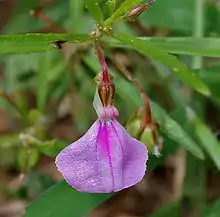Hybanthus
Hybanthus (green-violet)[2] is a genus of flowering plants in the family Violaceae. This genus name is Greek for "humpback flower", referring to the drooping pedicels of plants that are part of this genus. The genus is grossly polyphyletic and may contain up to nine different genera, of which Pombalia Vand., Cubelium Raf. and Pigea DC. have been previously recognised.[3]
| Hybanthus | |
|---|---|
 | |
| Hybanthus enneaspermus at Talakona forest, in Chittoor District of Andhra Pradesh, India. | |
| Scientific classification | |
| Kingdom: | Plantae |
| Clade: | Tracheophytes |
| Clade: | Angiosperms |
| Clade: | Eudicots |
| Clade: | Rosids |
| Order: | Malpighiales |
| Family: | Violaceae |
| Subfamily: | Violoideae |
| Tribe: | Violeae |
| Genus: | Hybanthus Jacq. |
| Species | |
|
See text | |
| Synonyms[1] | |
Species
Hybanthus contains the following species:
- Hybanthus attenuatus
- Hybanthus aurantiacus (Benth.) F.Muell.[4]
- Hybanthus calycinus (DC.) F.Muell.[4]
- Hybanthus concolor
- Hybanthus cymulosus C.A.Gardner[4]
- Hybanthus debilissimus F.Muell.[4]
- Hybanthus enneaspermus (L.) F.Muell.[4]
- Hybanthus epacroides (L.) Melch.[4]
- Hybanthus floribundus (Lindl.) F.Muell.[4]
- Hybanthus linearifolius
- Hybanthus monopetalus (Schult.) Domin[4]
- Hybanthus stellarioides (Domin) P.I.Forst.[4]
- Hybanthus vernonii (F.Muell.) F.Muell. [4]
- Hybanthus verticillatus
- Hybanthus volubilis E.M.Benn.[4]
References
- POTWO 2020.
- USDA, NRCS (n.d.). "Hybanthus". The PLANTS Database (plants.usda.gov). Greensboro, North Carolina: National Plant Data Team. Retrieved 15 May 2015.
- G. A. Wahlert, T. Marcussen, J. Paula-Souza, Min Feng, and H. E. Ballard, Jr. A Phylogeny of the Violaceae (Malpighiales) Inferred from Plastid DNA Sequences: Implications for Generic Diversity and Intrafamilial Classification. Systematic Botany 39. 1. 239-252. 2014
- "Hybanthus". Australian Plant Name Index (APNI), IBIS database. Centre for Plant Biodiversity Research, Australian Government, Canberra. Retrieved 2008-10-02.
Bibliography
- POTWO. "Hybanthus Jacq". Plants of the World Online. Royal Botanic Gardens, Kew. Retrieved 6 March 2020.
External links
This article is issued from Wikipedia. The text is licensed under Creative Commons - Attribution - Sharealike. Additional terms may apply for the media files.